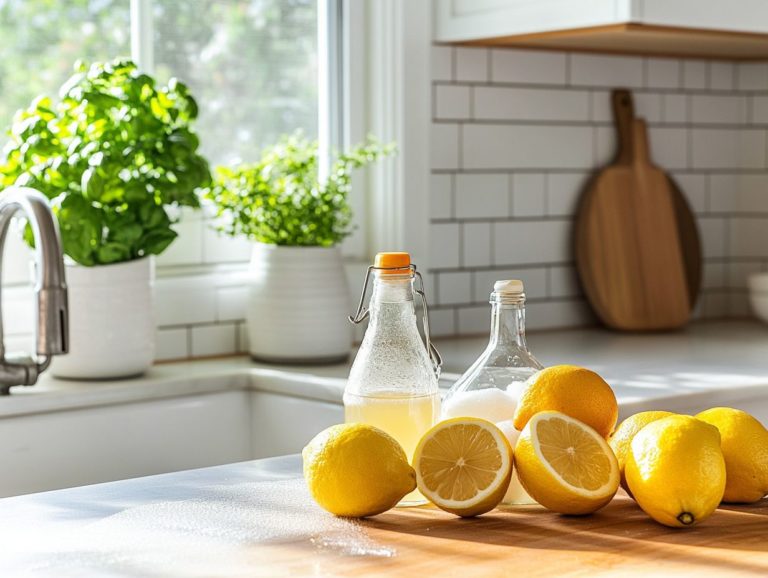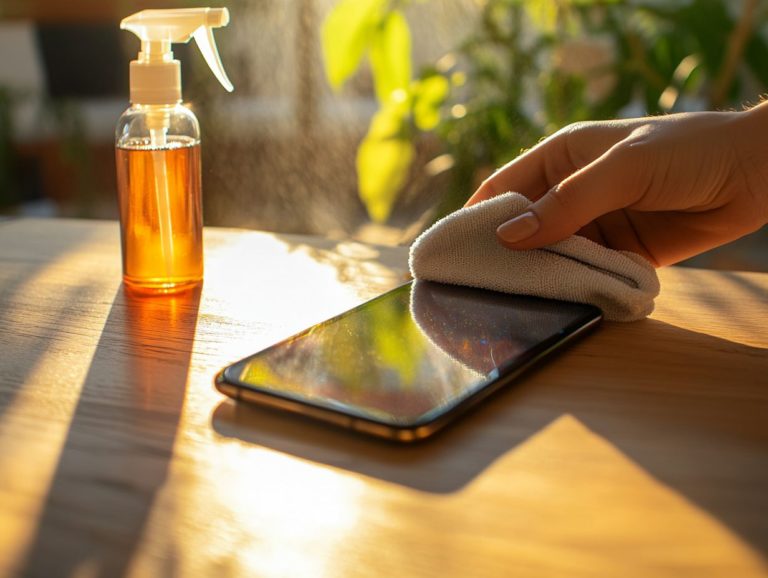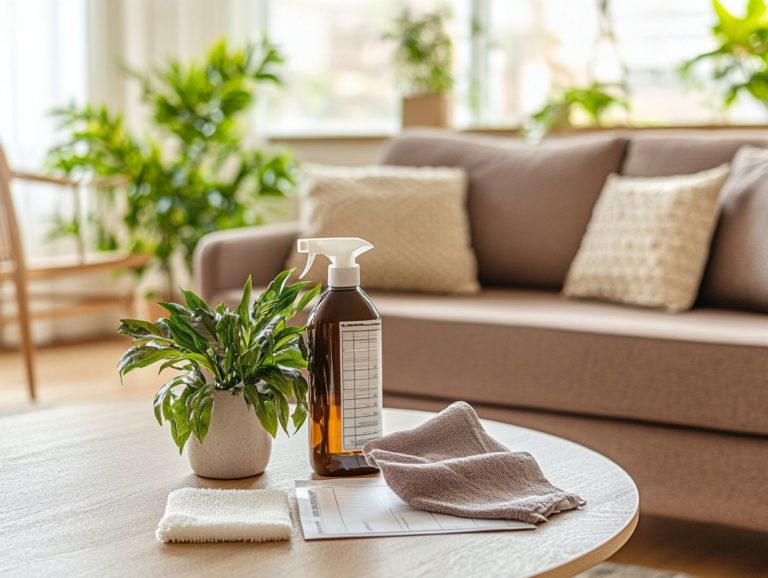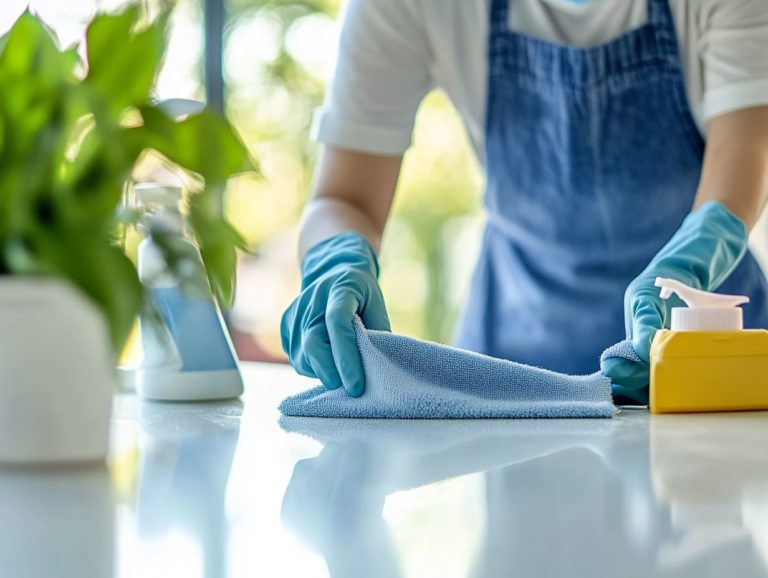How to Tackle Grease in the Kitchen
Cooking can indeed be a messy affair, with grease buildup often playing the role of the main antagonist in your clean kitchen narrative, especially when it leads to grease splatters on your kitchen walls.
Not only does it lead to unsightly stains and unpleasant odors, but it also brings serious risks to the forefront, ranging from fire hazards to health concerns. Grasping the reasons behind grease accumulation and mastering effective prevention and cleaning methods is crucial for maintaining a safe and hygienic kitchen environment.
This guide will illuminate the causes, dangers, and best practices to ensure your cooking space remains grease-free and inviting, offering expert tips and cleaning techniques along the way.
Contents
- Key Takeaways:
- What Causes Grease Buildup in the Kitchen?
- What Are the Dangers of Grease in the Kitchen?
- How to Prevent Grease Buildup in the Kitchen?
- How to Clean Grease in the Kitchen?
- What Are Some Tips for Deep Cleaning Grease in the Kitchen?
- How to Maintain a Grease-Free Kitchen?
- Frequently Asked Questions
- What is the best way to tackle grease in the kitchen?
- Can I use natural products to tackle grease in the kitchen?
- How often should I clean up grease in the kitchen?
- What is the best method for tackling grease on kitchen appliances?
- Can I prevent grease buildup in the kitchen?
- Are there any safety precautions I should take when tackling grease in the kitchen?
Key Takeaways:
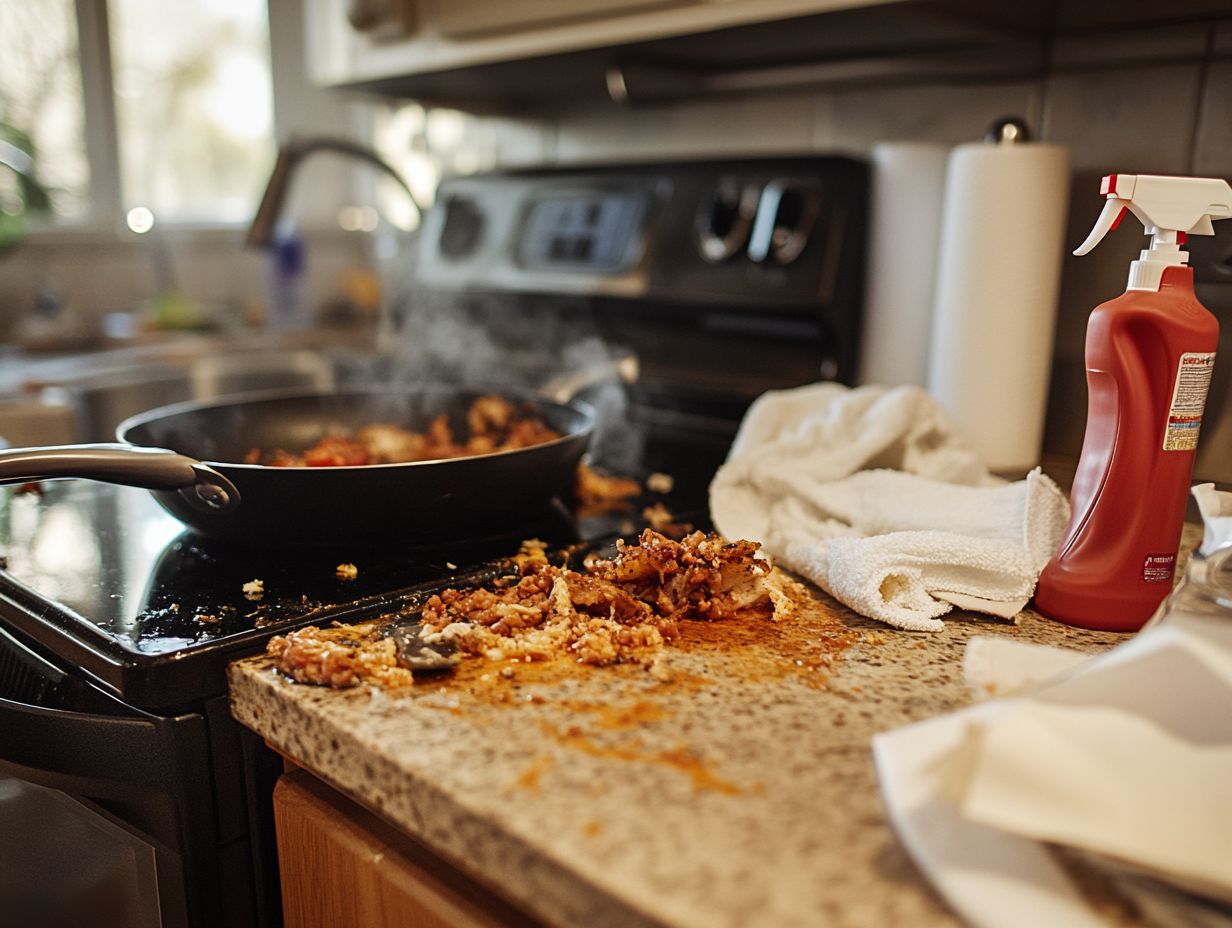
- Properly disposing of cooking oil and grease can prevent dangerous grease buildup in the kitchen.
- Regularly cleaning kitchen surfaces and appliances can reduce the risk of fire and health hazards caused by grease buildup.
- Using baking soda and vinegar, dish soap and hot water, or commercial degreasers can effectively clean grease in the kitchen and maintain a safe and hygienic environment.
What Causes Grease Buildup in the Kitchen?
Grease buildup in your kitchen can stem from a variety of factors, largely influenced by your cooking habits and the types of food you prepare. As you cook, oil and fat are released during the heating process, causing grease particles to settle on surfaces such as kitchen countertops, kitchen walls, and kitchen cabinets. This leads to a sticky residue that can be quite troublesome to deal with.
Furthermore, inadequate ventilation and ineffective cleaning methods play a significant role in exacerbating this issue. Regular home maintenance and using kitchen cleaning tools can mitigate these problems effectively. It s crucial to discover expert tips that will keep your kitchen sparkling clean and grease-free!
What Are the Dangers of Grease in the Kitchen?
The dangers of grease in your kitchen go far beyond mere aesthetics; they present serious health risks and fire hazards that demand your attention.
Accumulated grease has the potential to ignite, turning your cooking space into a hotbed for dangerous kitchen fires, especially around cooking appliances and exhaust systems. Moreover, the presence of grease can foster the growth of harmful bacteria and allergens, making it a critical issue for anyone who prioritizes cleanliness and safety in their culinary environment.
1. Fire Hazard
The buildup of grease on your cooking surfaces greatly elevates the risk of fire hazards in your kitchen, especially when paired with high heat. Grease is highly flammable, particularly around your stoves, ovens, and range hoods elements that can lead to devastating kitchen fires, putting both lives and property at serious risk. By maintaining a clean kitchen, you significantly reduce this threat and foster a safer cooking environment.
Did you know that grease buildup is a leading cause of kitchen fires? Act now to protect your home!
To combat this hazard, it s essential to adopt routine cleaning practices. Wiping down surfaces with hot, soapy water after each use and employing degreasers on stubborn spots can drastically lessen grease accumulation.
Regularly checking and cleaning your range hoods and vents is also vital in maintaining a safe cooking space. Keeping a fire extinguisher within reach and ensuring proper ventilation boosts safety in your kitchen. Using a degreaser like Fantastik can also help in removing grease stains effectively.
2. Health Risks
The health risks tied to grease buildup in your kitchen can have serious repercussions for everyone in your household, especially children and the elderly. A greasy environment is a breeding ground for bacteria and allergens, which can lead to respiratory issues and foodborne illnesses.
Regular cleaning and effective grease removal are essential practices for maintaining a healthy cooking space that is free from harmful contaminants. Try using cleaning products like Clorox Scentiva to help maintain a hygienic environment.
Beyond creating an unsightly mess, grease accumulation heightens the risk of kitchen fires, posing a significant danger to your entire family. To tackle these risks, try using natural cleaning methods that are both effective and safe.
Simple yet powerful ingredients like vinegar and baking soda can dramatically enhance the cleanliness of your surfaces. Sarah Wilson from Taskbird Team recommends these natural products for their effectiveness.
For example, a mixture of equal parts vinegar and water can cut through stubborn grime, while baking soda serves as an excellent abrasive to dislodge persistent grease. Use a soft sponge or clean rags to facilitate this cleaning process.
By implementing these practices, you not only elevate the safety of your kitchen but also foster a healthier atmosphere for everyone in your home.
How to Prevent Grease Buildup in the Kitchen?
Preventing grease buildup in your kitchen necessitates a comprehensive strategy that combines thoughtful cooking habits with consistent maintenance of surfaces. Using grease traps devices that catch grease from cooking before it goes down the drain and screens is an effective way to capture grease before it has a chance to accumulate on countertops, kitchen walls, and appliances.
Establish a regular cleaning routine with the right cleaning solutions to help maintain a cleaner and more organized cooking environment, elevating both the functionality and aesthetics of your kitchen.
1. Properly Dispose of Cooking Oil and Grease
Act now to properly dispose of cooking oil and grease to protect your kitchen and the environment! When you improperly dispose of these substances, you risk serious health hazards and environmental issues. Instead of pouring oil down the drain an action that can lead to plumbing nightmares collect it in a container and dispose of it in a way that safeguards against contamination.
Using orange oil or lemon oil can help break down grease before disposal. Use clean rags and soft cleaning tools to safely wipe away leftover grease from cooking surfaces and utensils, making it easier to dispose of responsibly.
Many local municipalities provide recycling options for used cooking oil, transforming it into biodiesel or other useful products. For instance, New York s Little Elves, led by Sabrina Fierman, offers eco-friendly grease disposal services. It’s wise to check for specialized waste disposal facilities that accept grease products as well.
By ensuring that oils are stored properly until they can be processed correctly, you play a crucial role in effective waste management practices that are both eco-friendly and beneficial for community plumbing systems.
2. Regularly Clean Kitchen Surfaces and Appliances
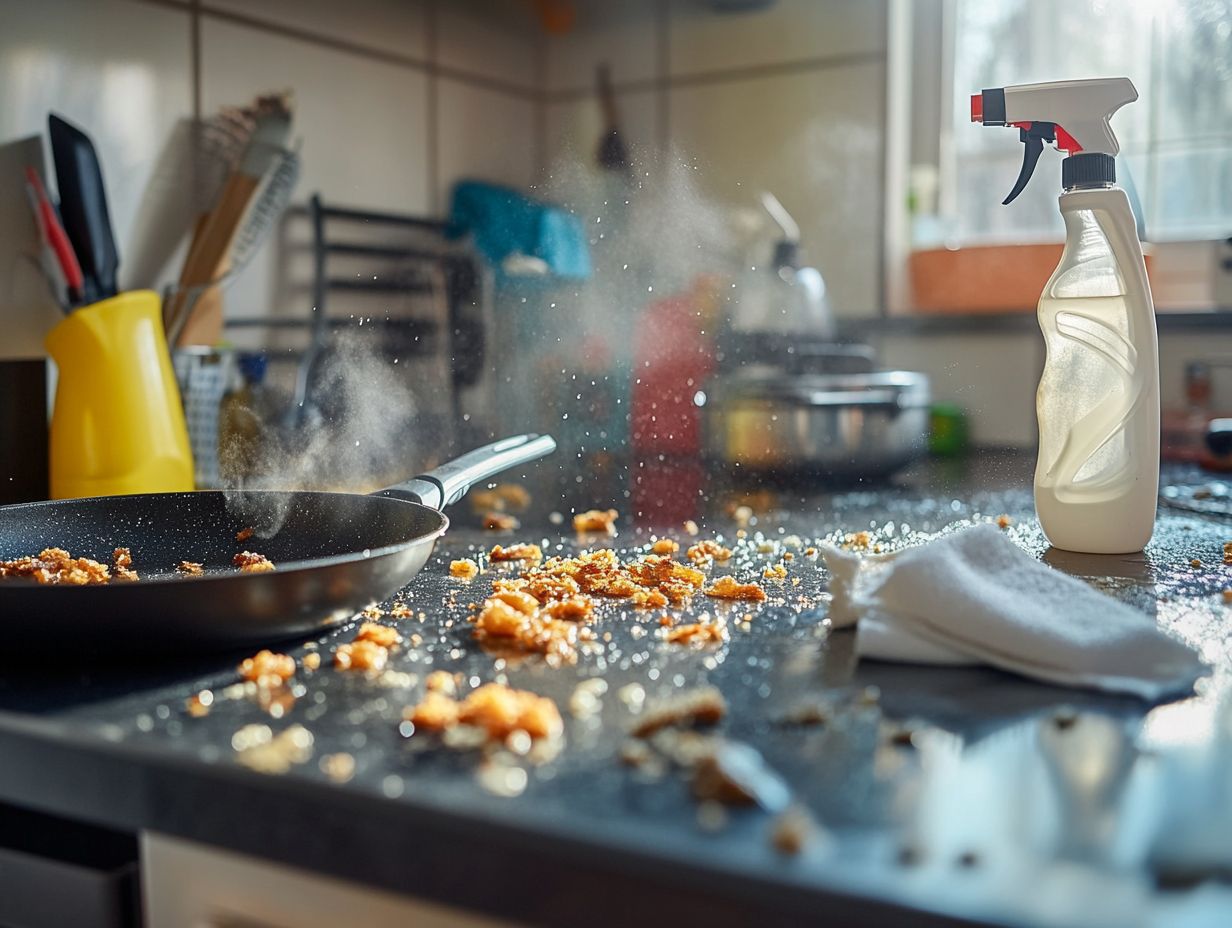
Regularly cleaning your kitchen surfaces and appliances is essential for maintaining a grease-free cooking environment. This proactive approach helps you eliminate any grease buildup before it escalates into a larger problem. By utilizing suitable cleaning products, such as degreasers and natural solutions like vinegar and baking soda, you can significantly enhance the effectiveness of your cleaning routine. A degreaser is a cleaning product designed to remove grease and oil from surfaces. Products like Krud Kutter and Zep Heavy-Duty Foaming Citrus Degreaser can be very effective.
Beyond choosing the right products, selecting the proper cleaning tools is crucial for achieving optimal results. For instance, soft sponges are perfect for delicate surfaces like kitchen tile and countertops, ensuring they remain scratch-free and undamaged. Conversely, stainless steel surfaces benefit from a microfiber cloth, which provides a streak-free shine without leaving behind lint or residue. Using products like Weiman Stainless Steel Cleaner ensures a polished finish.
Address spills and stains promptly. This prevents them from setting and helps you maintain a hygienic environment, reducing the risk of bacterial growth in your kitchen.
3. Use Grease Traps or Screens
Incorporating grease traps or screens into your kitchen design can dramatically reduce grease buildup, especially around cooking appliances and sinks. These clever devices capture grease before it has a chance to settle on your countertops and other surfaces, creating a cleaner and safer cooking environment.
By stopping grease from entering your drains, these systems not only elevate hygiene but also prolong the lifespan of your plumbing fixtures. You ll find various installation options tailored to your specific kitchen layout whether that s under-sink traps for smaller spaces or external systems designed to handle larger operations.
Punteha van Terheyden advises that integrating these features can transform your kitchen into a streamlined workspace, enhancing your cooking skills and cutting down on cleaning time. This allows you to devote more energy to your culinary skills instead of worrying about maintenance. For further inspiration, HRH Queen Elizabeth herself emphasized the importance of maintaining a clean and organized kitchen.
How to Clean Grease in the Kitchen?
Cleaning grease in the kitchen might seem like a daunting task, but with the right techniques and products at your disposal, you can tackle it with confidence. Using effective cleaning solutions, such as a degreaser like Goo Gone, can make the process much easier.
Consider using solutions like baking soda and vinegar or dish soap mixed with warm water these are excellent for breaking down stubborn grease on surfaces ranging from countertops to cabinets and even your high-end appliances. FOTILE, known for their advanced kitchen technology, recommends these methods for effective cleaning.
For more severe grease buildup, don t hesitate to reach for commercial degreasers; they can provide a powerful and effective cleaning solution that makes the job easier. Using a spray bottle with a diluted mixture of degreaser and water can cover larger areas efficiently.
With these methods, maintaining a spotless kitchen can be quick and easy!
1. Baking Soda and Vinegar Solution
A baking soda and vinegar solution stands out as a remarkably effective cleaning recipe for tackling grease on kitchen surfaces. When you combine these natural ingredients, they ignite a fizzing reaction that effortlessly lifts stubborn dirt and grease particles, making them a breeze to scrub away with a soft sponge or clean rags. This natural method is ideal for those looking to clean kitchen grease without relying on harsh chemicals.
To whip up this powerhouse cleaner, simply mix equal parts baking soda and vinegar in a spray bottle. This approach not only enhances convenience but also ensures a consistent application every time. For those stubborn grease stains, using a cleaning agent like vinegar and baking soda in a diluted mixture can yield impressive results.
This solution shines on a variety of surfaces, including countertops, stovetops, and even stainless steel appliances, all while avoiding the harsh chemicals often found in conventional cleaners. To put it to work, spray the mixture generously on the greasy area, allow it to sit for a few minutes to let the reaction work its magic, and then gently scrub with a soft cloth or sponge. This cleaning process is an excellent way to maintain clean kitchen countertops and other surfaces.
Beyond its eco-friendly credentials, this method is often more cost-effective and safer for households with children and pets, giving you peace of mind as you maintain a clean environment. This cleaning method leverages natural products, which are less likely to pose a health hazard compared to chemical cleaners.
2. Dish Soap and Hot Water
Using dish soap and hot water is one of the simplest yet most effective ways to clean grease in your kitchen. This powerful combination swiftly dissolves grease buildup on various surfaces, from countertops to appliances, allowing for a thorough cleaning process with minimal effort. For best results, consider using a high-quality dish soap like Krud Kutter or Zep Heavy-Duty Foaming Citrus Degreaser.
To effectively tackle stubborn grease, it s crucial to use hot water, as this enhances the soap s ability to break down oil particles. Create a simple mixture by adding a few drops of quality dish soap, like Zep Heavy-Duty Foaming Citrus Degreaser, to a bowl of hot water. This approach not only removes grease splatters but also leaves your surfaces sparkling clean.
Start by dampening a sponge or cloth in the soapy mixture and gently scrub the greasy area in circular motions. Rinsing the sponge frequently will help ensure that the grease is lifted away rather than spread around, leaving your surfaces sparkling clean and refreshed.
3. Commercial Degreasers
Commercial degreasers are your secret weapon in the battle against stubborn grease stains in the kitchen, transforming cleaning from a chore into a streamlined process. These specially formulated products often outperform DIY solutions, coming in convenient forms like sprays or wipes that enhance both efficiency and ease during your cleaning routine.
By using them, you maintain a clean and hygienic cooking environment, effortlessly breaking down tough residues that could otherwise invite unwanted bacteria. For example, when you reach for Weiman Stainless Steel Cleaner, you’re not just removing grime from your stainless steel appliances; you’re also achieving a stunning shine that elevates your kitchen surfaces to a whole new level. If you’re dealing with sticky messes, Goo Gone is your go-to for tackling adhesive residue on countertops and other surfaces. Commercial degreasers offer expert tips for maintaining a grease-free kitchen.
It’s important to adhere to the manufacturer’s instructions for optimal results and ensure proper ventilation while you work. Donning gloves is a must to protect your hands, and steering clear of food preparation areas during the cleaning process will guarantee that your approach remains both effective and safe.
What Are Some Tips for Deep Cleaning Grease in the Kitchen?
Deep cleaning grease in your kitchen demands a systematic approach that transcends ordinary surface cleaning. It involves employing specialized tools and techniques designed for thorough grease removal. Utilizing the right cleaning solutions and tools can significantly improve your cleaning efforts.
By utilizing equipment such as a pressure washer for outdoor surfaces and a steam cleaner for those hard-to-reach areas, you can significantly enhance both the efficiency and effectiveness of your grease cleaning efforts.
1. Use a Pressure Washer for Outdoor Surfaces
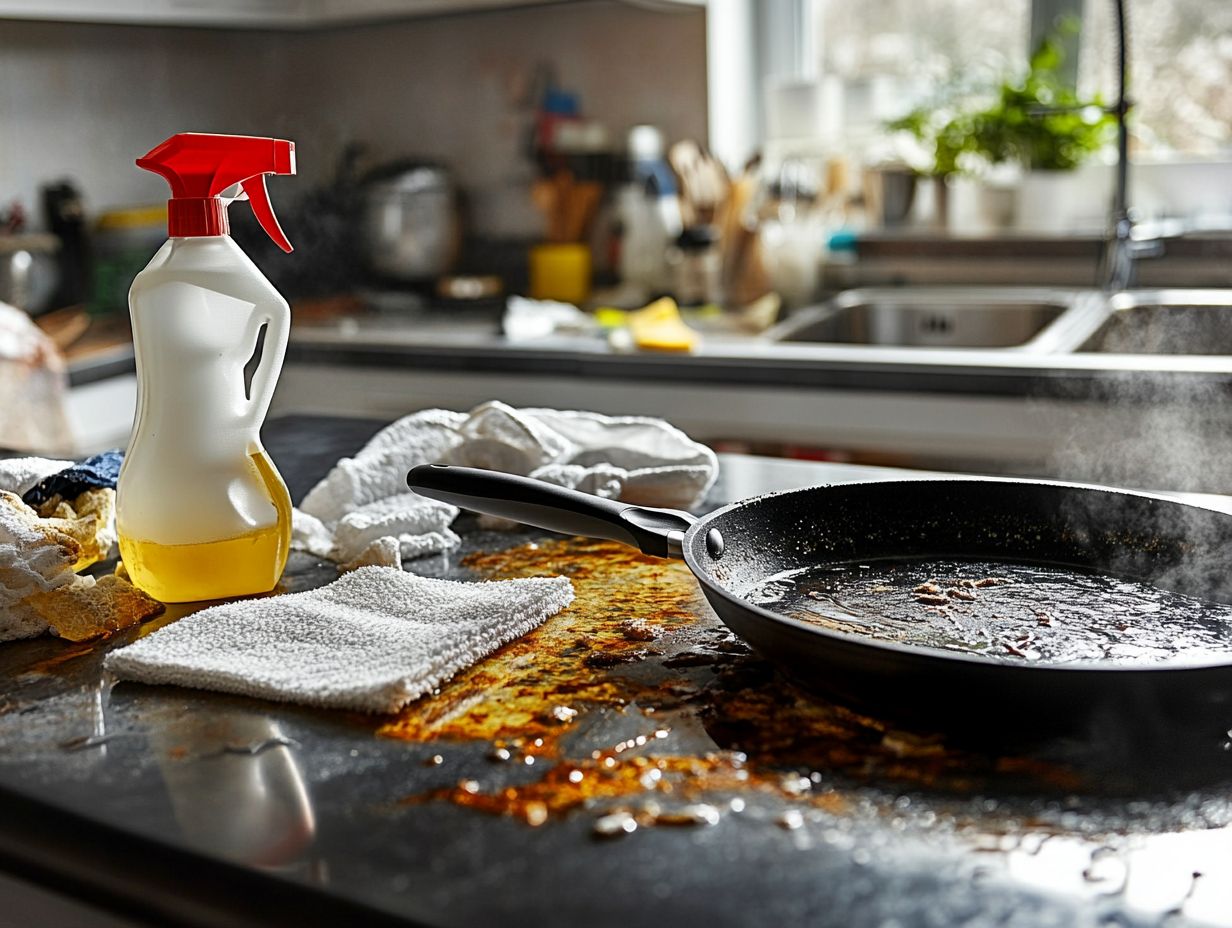
Using a pressure washer for your outdoor surfaces, like patios and grills, is an exceptional way to tackle grease and grime that tends to accumulate over time. This powerful tool blasts away grease buildup with ease, leaving your outdoor cooking areas clean and inviting for your next barbecue.
This cleaning technique works wonders for removing stubborn dirt from various surfaces, including stubborn stains caused by oil spills, food residue, and even mold or mildew. When you re ready to dive into outdoor cleaning, selecting the right nozzle is crucial; different settings can significantly impact your cleaning results.
Safety is key. Always wear protective gear, maintain a safe distance from surfaces, and do a test wash on a small area first. By adhering to these guidelines, you can maximize your pressure washer’s efficiency and transform dirty outdoor spaces into pristine areas that are perfect for entertaining.
2. Soak Greasy Pans and Utensils in Hot Water
Soaking greasy pans and utensils in hot water is an excellent strategy for loosening stubborn grease and food particles, making cleanup a breeze. This method shines for items that have seen heavy use in cooking, as it allows the grease to soften, paving the way for a more efficient clean.
To enhance soaking, add a few drops of dish soap or a specialized degreaser. This combination penetrates the grease effectively and significantly reduces your scrubbing time.
Soaking times can vary, typically ranging from 15 to 30 minutes, depending on grease buildup. Once soaking is complete, use a gentle scrubber that won’t scratch your pans to remove any remaining residue without risking damage to your cookware’s surface.
This two-step approach ensures a thorough clean and extends the lifespan of your kitchen essentials. Embrace this strategy and say goodbye to tough grease!
3. Use a Steam Cleaner for Hard-to-Reach Areas
A steam cleaner is a fantastic tool for deep cleaning tricky spots in your kitchen. It effortlessly eliminates grease accumulation from corners, crevices, and behind appliances. The high-temperature steam not only cleans but also sanitizes surfaces, ensuring your kitchen areas are fresh and hygienic.
With a steam cleaner, you can tackle various parts of your kitchen, including countertops, stovetops, and tile floors. Always read the manufacturer s instructions before starting. Don’t forget to wear gloves and ensure proper ventilation!
Steam cleaning is amazing for non-porous surfaces like stainless steel and sealed granite, making it perfect for sanitizing food preparation areas. Regular use of a steam cleaner helps maintain a pristine environment, preventing stubborn stains and germs from taking hold. Turn your kitchen into a healthier space for cooking and dining!
How to Maintain a Grease-Free Kitchen?
Maintaining a grease-free kitchen is not just a task; it s an art that requires consistent effort and effective cleaning strategies. Regularly update your kitchen ideas and incorporate new cleaning techniques to make this task more manageable.
To prevent grease accumulation, establish regular cleaning routines, thoughtfully organize your cooking tools, and adopt cooking habits that minimize grease production.
By doing so, you ll cultivate a healthier cooking environment for everyone in your household. Transform your kitchen into a space that inspires culinary creativity while remaining clean and inviting. Start your journey to a grease-free kitchen today!
1. Regularly Clean and Degrease Cooking Equipment
Regularly cleaning and degreasing your cooking equipment is crucial for maintaining a pristine, grease-free kitchen. By preventing the buildup of grease on essential appliances like stovetops, ovens, and fryers, you not only enhance their performance but also extend their lifespan.
Sabrina Fierman from New York’s Little Elves suggests using the right grease-removal products for the best results. Consider implementing a routine cleaning schedule that includes these key appliances.
In terms of tackling grease, selecting cleaning agents specifically formulated for each type of material is paramount. For stainless steel surfaces, a simple mixture of vinegar and water works wonders in breaking down tough grease while preserving that shiny finish.
Non-stick surfaces, however, call for a gentler touch; a mild soap solution will help maintain their delicate coating. When it comes to cast iron cookware, the approach is different. Use coarse salt and a little oil to scrub away grease without compromising the seasoning.
Always verify that the cleaning products you choose are suitable for food preparation areas, ensuring that your cooking environment remains safe and inviting.
2. Use Disposable Wipes or Paper Towels for Quick Cleanups
Using disposable wipes or paper towels for quick cleanups in your kitchen can be an incredibly effective strategy for managing grease and maintaining a pristine environment while you cook. These handy products enable you to tackle grease splatters and spills immediately, preventing them from becoming more difficult to clean later on.
Disposable wipes such as Clorox Scentiva and Bounty are excellent choices for quick, effective cleanups. Disposable cleaning products often come moistened with effective cleaners that effortlessly cut through grease, making the task feel far less daunting.
Brands like Clorox and Bounty are your go-to options, known for their reliability and strength. They deliver robust cleaning power without needing any additional sprays or cloths.
For even better results, consider using cleaning products that include natural oils like orange oil or lemon oil, which are known for their effective grease-cutting properties. By cultivating the habit of cleaning up messes right away, you can significantly minimize the buildup of grease and grime over time.
This makes cleaning up a breeze! Not only does this practice enhance the overall appearance of your kitchen countertops and cabinets, but it also promotes a healthier cooking space for you and your loved ones.
3. Educate Family Members and Guests on Proper Grease Disposal
Educating your family members and guests about proper grease disposal is essential for maintaining a pristine kitchen environment and preventing unwanted grease buildup. By establishing clear guidelines for disposing of cooking oil and grease, you can significantly mitigate the risks associated with grease in your kitchen.
Expert tips from professionals like Sabrina Fierman of New York’s Little Elves can be very helpful in this regard. Create clear guides for everyone to follow that highlight the do’s and don’ts of grease management.
Incorporating household rules, such as using designated containers for grease collection and issuing regular reminders during cooking sessions, will help reinforce these important practices. Engaging everyone in this initiative underscores the necessity of collective responsibility in keeping the kitchen free of grease.
When family members and guests actively participate in this process, it leads to a cleaner cooking space and fosters a sense of shared commitment to maintaining a safe and healthy environment. This shared commitment can be further enhanced by following cleaning tips from experts like Sarah Wilson and Punteha van Terheyden.
Watch this video for more tips on tackling grease in the kitchen!
Frequently Asked Questions
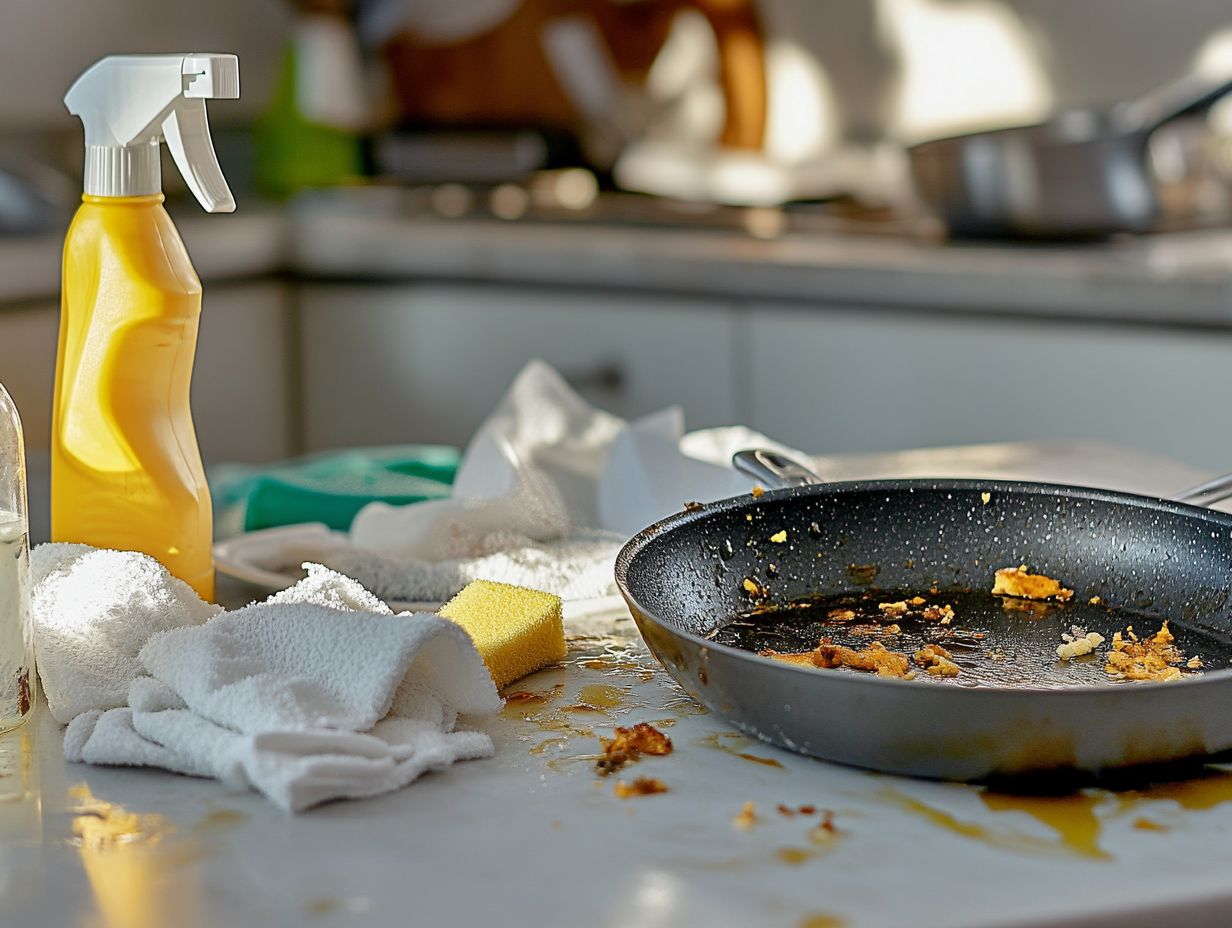
Start your grease-fighting journey today and enjoy a cleaner kitchen!
What is the best way to tackle grease in the kitchen?
The best way to tackle grease in the kitchen is to use a degreaser, which is a cleaning product specifically designed to remove grease from surfaces. These products break down tough grease and grime, making cleaning easier. For instance, Zep Heavy-Duty Foaming Citrus Degreaser and Weiman Stainless Steel Cleaner are highly recommended for their effectiveness.
Using a degreaser will help you keep your kitchen surfaces sparkling clean.
Can I use natural products to tackle grease in the kitchen?
Yes, several natural products can effectively tackle grease in the kitchen. Some options include white vinegar, baking soda, and lemon juice. You can also use orange oil and lemon oil, which not only clean but also leave a pleasant scent behind.
How often should I clean up grease in the kitchen?
It is recommended to clean up grease in the kitchen at least once a week. However, if you cook frequently, you may need to clean up more often to prevent buildup. A diluted mixture of dish soap and warm water can be very helpful in removing stubborn dirt and grease particles.
What is the best method for tackling grease on kitchen appliances?
The best method for tackling grease on kitchen appliances is to use a degreaser along with a soft cloth. Be sure to follow the instructions on the degreaser and avoid using abrasive scrubbers that can scratch the surface. For high-end appliances like those from FOTILE, consider using specialized cleaning products to maintain their finish.
Can I prevent grease buildup in the kitchen?
Yes! You can prevent grease buildup in the kitchen by regularly wiping down surfaces, using a splatter screen while cooking, and properly disposing of cooking grease and oil. Implementing effective kitchen organization and maintaining good cooking habits are also essential steps to ensure a grease-free kitchen.
Are there any safety precautions I should take when tackling grease in the kitchen?
Absolutely! Don t forget to wear gloves to protect your skin while tackling that stubborn kitchen grease. Always clean in a well-ventilated area to stay safe while you work, and avoid mixing different cleaning chemicals. Use a spray bottle to apply the cleaning agent for better coverage, and follow proper cleaning techniques for the best results.

